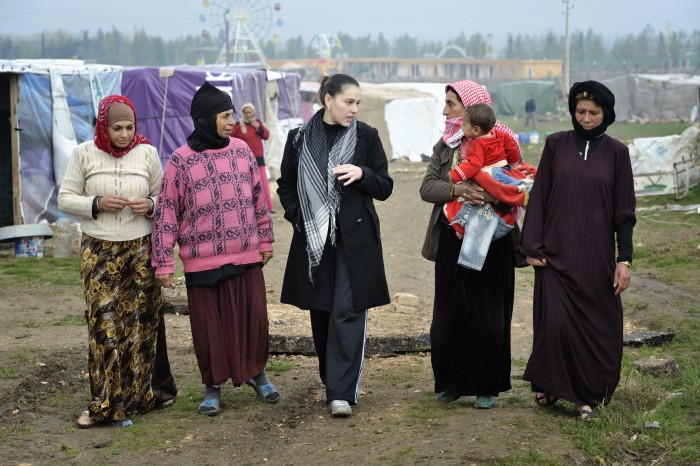
Sabeen Abdulsater (center, in black coat), project officer for the Bekaa Valley for International Orthodox Christian Charities, talks with women refugees from Syria in the village of Jeb Jennine, Lebanon. Photo: Paul Jeffrey
It is good to see that ‘Political Leadership to prevent and end conflict’ features as Core Commitment 1 for the World Humanitarian Summit next month in Istanbul, 23-24 May. This pays tribute to the fact that first and foremost, before speaking about effective and efficient humanitarian aid, world leaders in Istanbul must acknowledge their responsibility to take action on preventing and ending conflict and addressing its root causes. Preventing and ending conflicts requires top-level discussions and efforts, complemented at the same time by bottom-up approaches and efforts to strengthen social cohesion and address grievances. It requires courageous leadership that acts early, invests in stability and ensures broad participation by affected people and civil society. This type of courageous leadership and broad bottom-up participation is needed if we want to reach a more coherent and determined approach to conflict prevention and resolution.
In light of this, we as ACT Alliance have made our own commitment to support the WHS Core Commitment 1, namely:
‘We will use our influence with our constituencies, civil society and government leaders to promote stability and long-term community reconciliation, strengthen social cohesion and address grievances.’
As an international network of church and faith-based organisations, over 75% of ACT Alliance’s members are rooted in their societies in the global south, where they are trusted by the communities they serve. It means these organisations are always there – before an emergency, during, and after. And it is to these groups that people turn in emergencies for refuge, for help, and for moral support.
Given our members’ reputations often as recognised and respected stakeholders in their countries with well-established links with local and national governments, we are well placed to achieve our Commitment, because we can very practically play a meaningful role in dialogue, policy and peace-building discussions.
Faith is one of the strongest forces and motivators for bringing about change in society and in people’s lives. This force needs to be geared towards stability, peace and development both in times of disasters and conflicts, but also during peacetime to reduce conflict risks and enhance social cohesion. Whether it is the churches changing burial rituals in West-Africa to prevent the spread of Ebola, or engaging in mediation between rivalling parties, or even churches and Islamic leaders linking to pre-empt possible tensions between Islam and Christianity, we as ACT Alliance have great potential to engage in this field. In parts of the world we are already engaging in this field, but there is potential to do much more. Therefore, as part of our commitment we will make successful conflict prevention efforts visible by capturing, consolidating and sharing good practices and lessons learnt within and outside the ACT Alliance.
We have also signed up to the Core Humanitarian Standards and the Charter for Change, which aim to (a) enhance accountability towards people who are entitled to receive humanitarian aid, and (b) to foster localisation of humanitarian aid, for example by increasing the amount of direct funding to southern-based NGOs. These give us a powerful tool to promote the engagement of local actors and people in cities and villages, to take care of their own emergency aid, linking it to recovery and peace as they conceptualize it themselves. That’s at the core of our work. Our members are rooted in this group of local actors and as an alliance we believe empowering them in their roles as faith-based agencies can facilitate the building of bridges between conflicting parties or the bringing together of several parties to collaborate for building back better.
Furthermore, since ACT Alliance members are multi-mandate organisations, this enhances the possibilities they can play also in reducing fragility by investing in the development of inclusive and peaceful societies. In working together with platforms at local, national and regional level we are supporting early action and conflict resolution capacities of these actors. We thereby actively promote resilience both towards natural disasters and conflicts. By doing so we link the need to help alleviate suffering and save lives with the longer term desire of ACT members and their constituencies to cope better with unforeseen and negative conditions in the future, be they wars, drought, earthquakes, floods, economic crises and so forth.
Speaking out for a just world is at the core of the mission of ACT alliance. If basic rights are at stake, churches and faith-based organisations have a role that we can play, and we accept that role. Therefore, at the WHS and beyond, we will honour our Commitment using our unique position to help develop solutions with and for people that address grievances, strengthen social cohesion and promote stability and long-term community reconciliation.
___________
 Jeroen Jurriens is a Disaster Manager at Inter-Church Organisation for Development Cooperation (ICCO Cooperation) in the Netherlands, member of ACT Alliance. He specializes in the fields of resilience, Disaster Risk Reduction and humanitarian action. He is chair of the ACT Alliance Community of Practice on Disaster Risk Reduction/Climate Change Adaptation and member of the Working Group on Disaster Risk Reduction within the Voluntary Organisations in Cooperation in Emergencies (VOICE). He lives in the Netherlands, is married and father of two children.
Jeroen Jurriens is a Disaster Manager at Inter-Church Organisation for Development Cooperation (ICCO Cooperation) in the Netherlands, member of ACT Alliance. He specializes in the fields of resilience, Disaster Risk Reduction and humanitarian action. He is chair of the ACT Alliance Community of Practice on Disaster Risk Reduction/Climate Change Adaptation and member of the Working Group on Disaster Risk Reduction within the Voluntary Organisations in Cooperation in Emergencies (VOICE). He lives in the Netherlands, is married and father of two children.